The Worst 11 Foods to Eat When You’re Trying to Lose Visceral Fat, According to Dietitians and Doctors
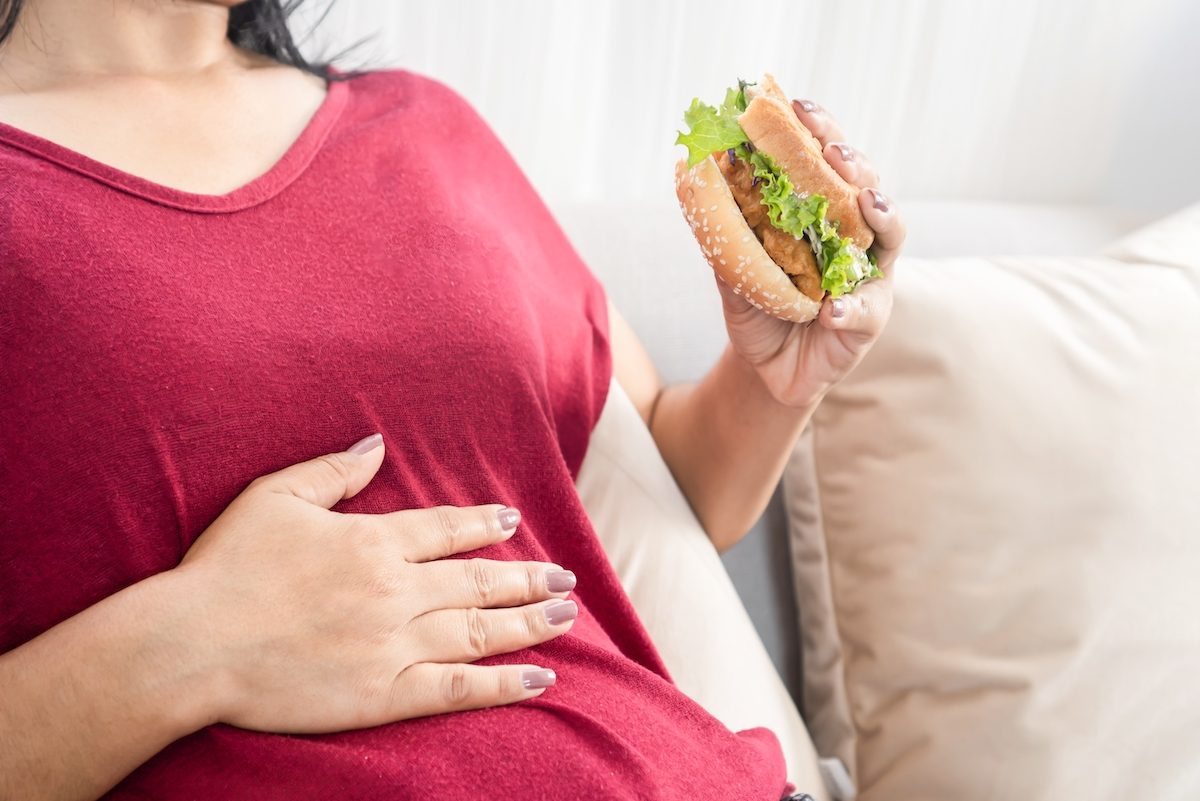
Losing visceral fat is vital for maintaining overall health, so knowing the foods that help cause the deadly belly fat is essential. “The most common way people develop visceral fat is generally by their diet,”Dr. Puja Uppal, DO, board certified family medicine physician explains. “Usually, foods high in carbohydrates like bread, cereals, and processed fats lead to an increase in visceral fat.” Unlike subcutaneous fat that you pinch and feel, visceral fat is hidden deep in your abdomen and coils around your organs. It’s been linked to some cancers, type 2 diabetes and more. “Too much visceral fat is unhealthy because of its location in relation to key organs,” Dr. Mahmud Kara, MD Internal Medicine tells us. “High levels of visceral fat can have been associated with negative health outcomes like diabetes, heart disease, high cholesterol, increased blood pressure, Alzheimer’s, and more. Visceral fat has also been associated with increased inflammation, insulin resistance, problems with hormone production, and other health issues.”
There’s a number of ways to lose visceral fat like reducing stress, working out at least 30 minutes a day, getting at least seven hours of quality sleep every night and diet, which plays a major role. “Reducing processed sugar in your diet is probably the best way to lose those internal pounds,” Dr. Jessica Cutler, M.D., Mercy Medical Center Weight Management Expert and Bariatric Surgeon, tells us. “Sugar is used by your body as energy for your cells, but if you don’t use all the energy you eat, your body stores the extra as a backup supply for later (in the form of fat). Eating a lot of processed sugar can lead to quite a lot of it getting stored as fat. Sugar sneaks its way into many foods where you might not expect it to be – even in things that don’t taste sweet, like potato chips. Watch out for drinks, too – bottled juices, teas and sodas often come with a lot of extra sugar. Flavored coffees and tropical smoothies are also known to hide lots of sugar as well.”
The best way to tell if you’re losing visceral fat by how your clothes are fitting. Dr. Culter says, “The first thing you will likely notice is the narrowing of your waistline, even before you see the number on the scale start to move. Pants may fit more loosely or you may need to take your belt in a notch or two. If your doctor is checking blood work, you may notice improvement in your blood sugar numbers or your liver health numbers.” So what are the 13 worst to eat when you’re trying to lose visceral fat? Read on to discover each one.
Alcohol

Trista Best, Registered Dietitian, Environmental Health Specialist and Adjunct Nutrition Professor tells us, “While an occasional glass of wine or other alcoholic beverage may be fine in moderation, excessive alcohol consumption can contribute to weight gain and increase the risk of health problems. First, it is high in calories, with 7 calories per gram because it is actually considered a macronutrient. This is almost as many calories as pure fat, which has 9 calories per gram. In comparison, carbohydrates and protein have 4 calories per gram. Second, alcohol can interfere with your body’s ability to burn fat. When you drink alcohol, your body burns alcohol for energy instead of burning fat, which can make it difficult to lose visceral fat. Third, alcohol can stimulate your appetite and make you more likely to eat more food, especially high-calorie, unhealthy foods which contribute to visceral fat storage. Fourth, alcohol can interfere with your sleep, which can affect your metabolism and hormone levels.”
Frozen Convenience Meals
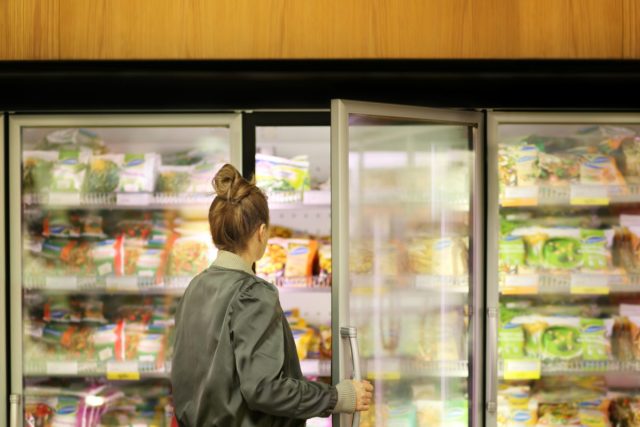
According to Best, “Frozen meals can contribute to weight gain and increase the risk of abdominal obesity, also known as visceral fat, if they are high in calories, unhealthy fats, and added sugars and are consumed in excess. Like any other food, the nutritional content of frozen meals can vary widely. Some frozen meals may be relatively healthy, while others may be more processed and less nutritious. It’s important to read the nutrition label and ingredient list on frozen meals to understand their nutrient content. Some frozen meals may be high in calories, saturated fat, and sodium, which can contribute to weight gain and increase the risk of health problems. They may also be low in fiber and other important nutrients. To help with weight management and reduce the risk of abdominal obesity, it’s a good idea to choose frozen meals that are lower in calories and higher in nutrients, such as those that are made with whole grains, lean protein sources, and a variety of vegetables.”
Processed Foods
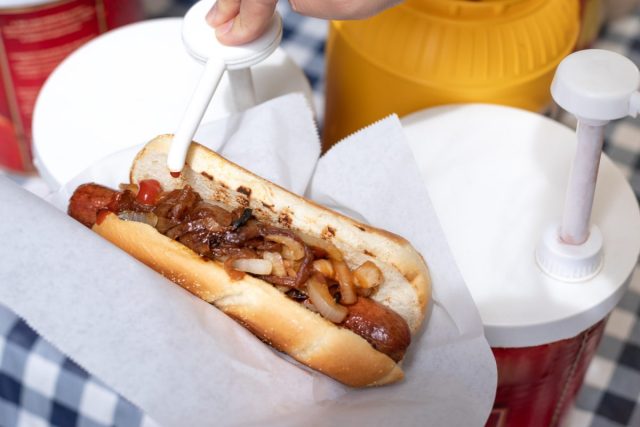
Jesse Feder, a personal trainer and registered dietitian with My Crohn’s and Colitis Team tells us, “Processed foods such as hot dogs, sausages, frozen meals, sugary cereals, and candy are some of the worst foods to consume if you are looking to get rid of visceral fat. Processed foods tend to be high in sodium and other preservatives in order to keep them shelf stable for long periods of time. Additionally they tend to be higher in unhealthy fats, sugar, and calories in order to make them taste good. These are all significantly associated with an increase in visceral body fat.”
Candy
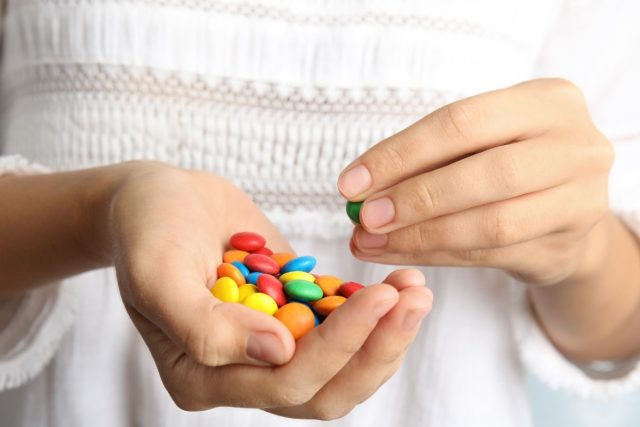
Dr. William Li, bestselling author of the upcoming Eat to Beat Your Diet: Burn Fat, Heal Your Metabolism, and Live Longer, explains, “Most candy is made of high fructose corn syrup, artificial flavorings and preservatives. These all trigger the growth of adipose tissue(fat), especially visceral fat.” John Hopkins Medicine says, “The average American eats a whopping 20 teaspoons of sugar every day, according to U.S. government figures. That’s well above the American Heart Association’s recommendation of 6 teaspoons per day for women and 9 per day for men.” A variety of research has drawn a link between sugar consumption and excess body weight. “I don’t think we have enough evidence yet to suggest that sugar is the reason for the obesity epidemic,” says Johns Hopkins cardiologist Chiadi E. Ndumele, M.D., M.H.S. “But there is enough evidence to say that elevated sugar consumption is an important contributor to weight gain.”
Baked Goods
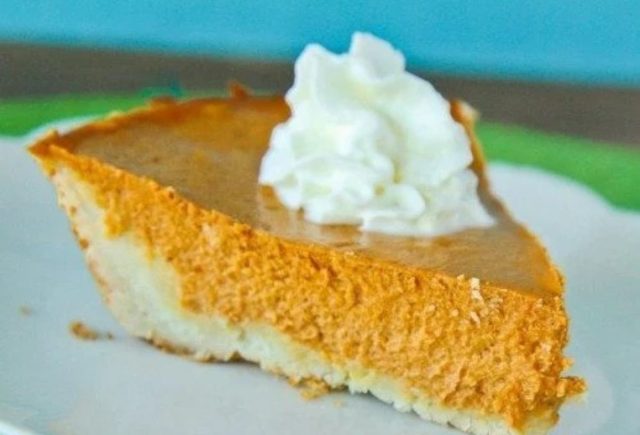
Feder says, “Baked goods such as cookies, cakes, pies, brownies, and cupcakes, to name a few, are easily some of the worst things to eat when trying to lose visceral fat. Like processed foods, baked goods tend to contain a good amount of preservatives in them to keep them fresh. Additionally, baked goods are extra high in unhealthy fats and sugar. They typically have a lot of butter, margarine, and creams, which are quite high in saturated fats. These fats increase LDL or bad cholesterol levels as well as contribute to an increase in visceral fat. The sugar and fat also add a lot of calories to one’s diet which contribute to weight gain and visceral fat gain.”
Fried Foods
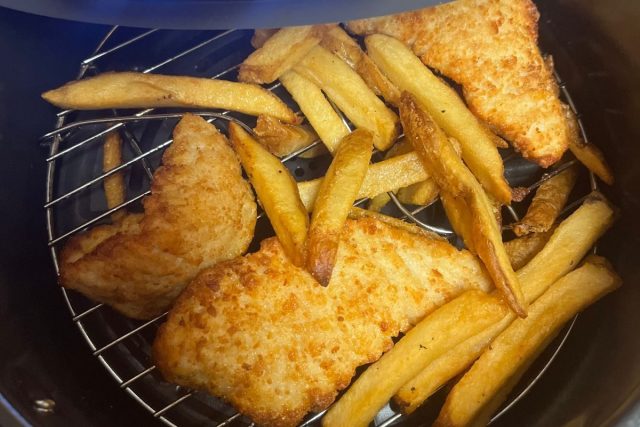
Feder explains, “Similarly to baked goods, fried foods tend to be very high in unhealthy fats and calories. These include things such as fried desserts, french fries, donuts, chips, empanadas, and tempura, to name a few. The oils used to fry these foods tend to be high in saturated and/or trans fats which contribute significantly to an increase in bad cholesterol levels as well as visceral fat accumulation in the body. On top of that, the oil adds a significant amount of calories to the food which can lead to unhealthy weight gain and visceral fat gain.”
Include doughnuts in this group. McSorley says, “Doughnuts are an unhealthy food choice for anyone trying to lose visceral fat. These sugary treats are high in calories, fat and sugar content, all of which make it difficult to shed pounds and excess belly fat. Doughnuts typically contain simple carbohydrates such as white flour, sugar, fructose or high-fructose corn syrup. These simple carbs are quickly broken down by the body, causing rapid spikes in blood sugar levels and insulin. This can lead to fat storage around the abdomen as visceral fat. To avoid this type of weight gain, try to stay away from doughnuts as much as possible.”
Ice Cream
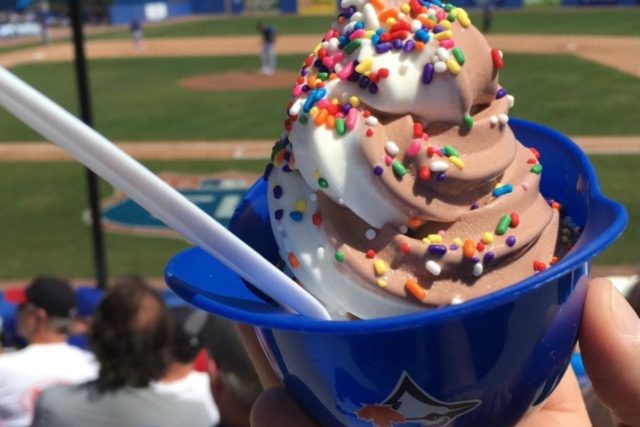
Kieran McSorley, Registered Dietitian with Brentwood Physiotherapy Calgary explains, “One of the worst foods to eat while trying to lose visceral fat are those that are high in sugar and unhealthy fats, like ice cream. Ice cream is one of the worst foods to eat while trying to lose visceral fat. This is because it is high in calories, sugar, and unhealthy fats, all of which contribute to increased body fat storage around the stomach area. Additionally, many ice creams contain artificial sweeteners and preservatives that can actually increase inflammation in the body, making it more difficult to lose weight. Eating ice cream regularly can also lead to food cravings, which can make it even harder to stay on track with healthy eating habits.”
Chips
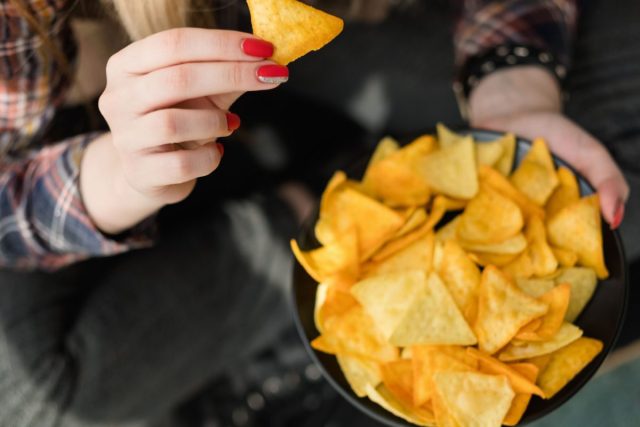
McSorley tells us, “Chips are an unhealthy food choice when trying to lose visceral fat. They are typically high in calories and loaded with saturated fats, sodium, and other additives. Eating chips can contribute to visceral fat and an increased risk of type 2 diabetes, heart disease, and other chronic health conditions.”
SFGATE reports, “Potato chips may satisfy your need for something salty and crisp, but they don’t do a lot to squelch your hunger. Research published in Advances in Nutrition in 2016 reported that, when compared to people who consumed six cups of low-fat popcorn, people who consumed potato chips reported lower levels of satiation and greater hunger levels. If you choose potato chips as a snack, they’ll do little to curb your hunger and only pile calories onto your daily intake.”
Soda
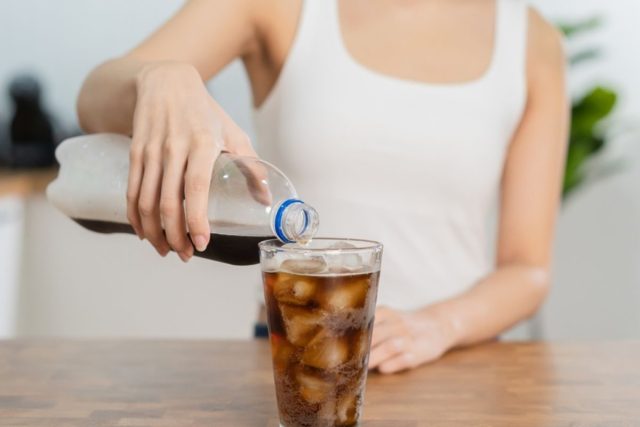
According to McSorley, “Soda is one of the worst foods to have when trying to lose visceral fat. This is because soda contains large amounts of added sugar, which can quickly lead to weight gain and increase your risk for other chronic diseases. In fact, research has shown that drinking a single 12-ounce can of soda per day can result in an extra 1-2 pounds of weight gain per month. Additionally, the phosphoric acid in soda can cause your body to retain more water, which can further lead to weight gain.”
Refined Carbs
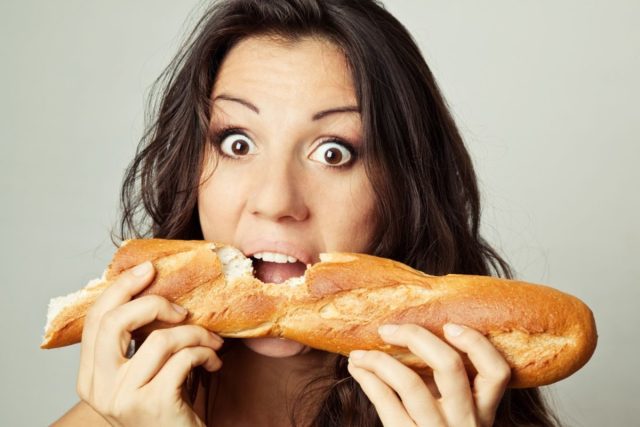
Lisa Richards, a nutritionist and creator of the Candida Diet tells us, “Refined carbohydrates have many negative side effects for our health and visceral fat is just one of them. White and enriched breads in particular have undergone a refining process where the fiber and beneficial nutrients are removed and, possibly, replaced with synthetic versions. These refined carbs lead to quick sugar spikes and inflammation, both of which stall weight loss and damage health. It is best to use whole wheat bread or other whole grain breads that have not been refined. A rule of thumb is to look at the ingredients list and avoid any breads that start with enriched. A diet high in protein can help to reduce and prevent visceral fat. Lean protein both boosts metabolism and increases satiety. An increased metabolism will lead to weight loss and having a feeling of fullness will prevent overeating and indulging in calorie-dense, sugar-laden foods. High-protein foods to consume to lose your visceral fat and keep it off include lean poultry, fish, nuts, eggs, low-fat cottage cheese, Greek yogurt, chia, lentils, and quinoa.”
High Fat Dairy
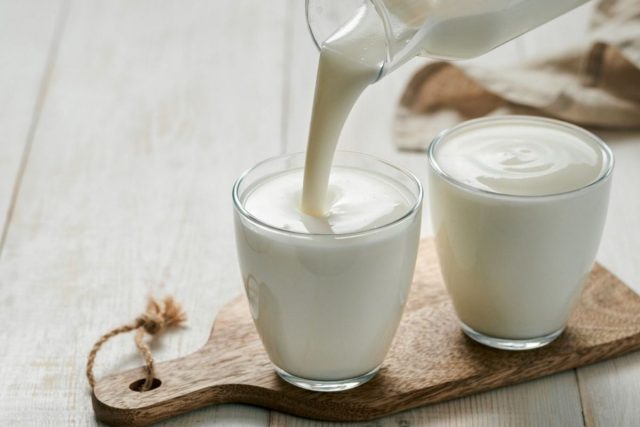
Richards says, “Consuming high-fat dairy products, such as whole milk, cheese, and butter, may contribute to an increase in visceral fat if these foods are consumed in excess and in place of other healthier options. This is because these foods are high in saturated fat, which has been linked to an increased risk of abdominal obesity and other health problems. It’s important to keep in mind that not all fats are bad for you, and it is possible to include healthy fats in your diet while still maintaining a healthy weight. Some sources of healthy fats include avocados, nuts, seeds, olive oil, and fatty fish.”








